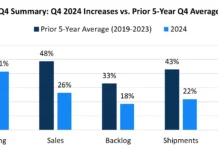By Josef Keglewitsch, partner, Ice Miller LLP
The industry likely has seen more upheaval in commercial contracts in the past five years than it did in the 20 years that preceded that period. It is no coincidence that recent history has seen an economy beset by unprecedented challenges: pandemics, labor shortages, energy crises, transportation challenges and a supply chain that has come unhinged. The risks and uncertainties that these circumstances have created have had a ripple (or, perhaps more accurately, a tidal wave) effect on the landscape of commercial contracts, as businesses attempt to adjust to both the short-term and long-term ramifications that have resulted. How companies document commercial relationships has shifted in a number of important ways.
Not surprisingly, one key contracting objective is locking down mission-critical commercial partners. One would presume that this always has been a goal but, frankly, it recently has taken on a newfound importance and fewer businesses are asleep at the wheel on this front. Longer-term agreements (with thoughtful renewal provisions) increasingly are common. Termination provisions are receiving more scrutiny as the need to terminate for performance issues increases and, ironically, the desire to actually end a relationship decreases as viable alternatives become harder to find.
Those on the vendor or supplier end of the equation are experiencing unparalleled leverage to increase prices. Buyers in no position to lose a supplier are finding it difficult to flex contractual muscles and resist increases in prices. The axiom seems to be that a more expensive supply is better than no supply at all. Sellers either are negotiating deals to boost prices or entering into contracts that contemplate the ability to increase pricing in order to pass through the volatile nature of labor, raw material and utility inputs. Similarly, agreements more frequently shift shipping and transportation costs to the purchaser as those variables become ever more expensive and volatile.
More forgiving delivery schedules and quantity terms also are progressively becoming more common. Many sellers historically stuck with “requirement” contracts or similarly onerous quantity terms are seeing a heightened ability to wriggle out of those arrangements.
Forecasting needs rather than preset quantities or unilaterally determined purchase order quantities is one strategy to reduce exposure to quantity targets that just may not be doable. And, either by shifting transportation obligations to the buyer or loosening obligations, sellers are reducing risks to a highly uncertain logistics environment. Passing through increases in shipping costs to customers or shifting that financial obligation altogether are potential avenues.
A less lenient payment environment also is increasingly on display. Paralleling the heightened ability and willingness to raise prices, suppliers also are less reluctant to insert late payment provisions and the ability to suspend work or change payment terms (to COD, for instance) if customers fail to timely pay (or otherwise improve such terms that existed but which historically were ignored).
These challenges seen in the current sales environment have been destabilizing (and even destructive) forces from an operational standpoint and also have created an assortment of legal challenges. There has been unprecedented uncertainty as to a business’s ability to perform, its vendor’s ability to perform and whether its customers actually are ready for it to perform. As a consequence, force majeure provisions have crept way out of contractual boilerplate and regularly are front and center in commercial relationships (and disputes).
Force majeure provisions, representing a shield against contractual nonperformance when unexpected circumstances present themselves, proved to be worth the weight in gold as the marketplace progressively became more squirrely over the past several years. Some businesses were shocked to find those provisions did not give an “out” for which the business had hoped. Other businesses were thrilled with the “get out of jail free” card it offered, and still other businesses were left scratching their heads trying to sort out if (and how) such terms fit their situation, if at all. Ill-conceived and rarely considered force majeure provisions are the rule, not the exception, exacerbating consternation over the pragmatic meaning of these provisions.
Smart businesses have reviewed their form contracts and those of their vendors and customers to refine them to fit challenging new environments – ensuring pandemics, national health crises, governmentally imposed shutdowns and alike were covered. Efforts were made to be certain businesses actually knew what it meant as a practical matter if a force majeure provision was triggered (and to rework if the business was landing on the wrong result).
Another recent phenomenon that has impacted commercial contracting has been a spike (at least in interest, if not in actual repositioning of operations and supply chains) of reshoring. Businesses have been forced to consider more holistically where they and their suppliers are located and the potential benefits of relocation domestically. But taking advantage of reshoring requires a revisiting of contractual relationships to accommodate any reworking of supply chains. And, as a forward-looking matter, it increasingly has become imperative to ensure that the contracts one has in place are flexible enough to actually allow for reshoring if and when any such initiative is rolled out.
On the most basic level, this business climate has required that companies scrutinize how they view their contracts and contractual affairs. The upheaval has been great, and business as usual just will not cut it anymore. Template or form contracts must be reviewed and reworked to ensure they pass muster and accommodate the challenges presently faced. Businesses also are pushing back on problematic terms that lock them into assumed circumstances that recent history tells us are not safe to assume for long. The once sleepy arena of commercial contracting is more regularly the subject of keen attention and vigorous activity.
It cannot be denied that the past several years have been challenging in the variety and scope of uncertainties presented to the marketplace. That said, where there is uncertainty there is opportunity; in this case, the opportunity to ensure that contractual relationships are state-of-the-art and ideally positioned – positioned to quickly and painlessly accommodate changes, recognize the volatility of pricing, alleviate the risk of an unpredictable supply chain and maneuver around governmental regulations and restrictions.
The wisdom of taking action to stay ahead of this changing environment, including developments businesses cannot forecast today, is perhaps the only inevitable feature of commercial contracting in a new world.
Josef Keglewitsch is a partner with Ice Miller handling complex corporate and business law issues for both private and public companies, with a focus on and extensive experience in mergers and acquisitions, general corporate counsel, complex commercial relationships and entrepreneurial legal issues. Keglewitsch graduated from Kalamazoo College in 1993 with his Bachelor of Arts, magna cum laude. In 1996, he earned his juris doctor from Case Western Reserve University, cum laude. More information: Josef.Keglewitsch@icemiller.com or 614.462.2279.





